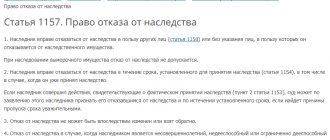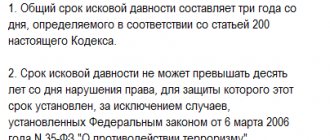Who can be considered an unworthy heir?
Any person who, by law, is entitled to a part of the deceased’s property, even if it is obligatory, can be recognized as an unscrupulous heir.
There are several types of such inheritance recipients:
- Absolutely inappropriate - citizens who have committed illegal actions. If they prevented the testator from making a will or are parents deprived of the rights to raise a child. However, the latter situation can end successfully for the heirs of the property if they are written inside the last will of the deceased.
- Conditionally unworthy - persons who did not provide lifetime support to the testator. For example, if a parent did not fulfill his obligations to support a minor or disabled child, he will belong to this group. When children were assigned to be dependent on their parents through alimony payments, but this did not actually happen, they are also considered conditionally unsuitable.
https://img.rg.ru/video/content/0/03/05/rosgaz-2014-03-14_mas.mp4
Parents who have been deprived of parental rights or who have not officially adopted the deceased cannot inherit the property of deceased children, even if they are biological relatives.
If there are heirs who did not pay alimony maintenance ordered by the court, they may be entitled to part of the testator's property if he indicated them in his will.
The recognition of an heir as unworthy occurs only through the court, in the presence of significant evidence.
Often, this type of successor includes those who simply do not take enough part in the life of the testator, do not communicate with him, or commit other unmoral acts. But these are insufficient grounds for recognition by the court as an unscrupulous heir.
Unlawful acts against a deceased relative include:
- infliction of bodily harm of varying severity, beatings;
- threats of physical harm, imprisonment;
- incitement to suicide;
- misrepresentation;
- transmission of false information;
- involvement in the death of the testator;
- illegal appropriation of the deceased’s belongings, which infringes on the rights of other heirs;
- theft or falsification of the last will of the deceased, renunciation of inheritance or other valuable documents.
The testator can specify in his last will those persons whom he deprives of the right of succession. In this case, the citizen will become an unworthy heir under the will. It is impossible by will to refuse inheritance from those who are entitled to an obligatory share.
Who are the unworthy heirs?
Often, citizens dissatisfied with the distribution of property try to accuse others of misconduct and have the heir recognized as unworthy.
In fact, an unworthy heir is a person who, by his behavior and attitude, gives grounds to refuse inheritance. The reason for the exclusion of an heir may not be any offense, but certain circumstances mentioned in the legislation.
Unworthy heir: grounds for recognition as unscrupulous
The grounds for refusal of inheritance should be looked for in the provisions of the Civil Code of the Russian Federation, Article 1117:
- Fraudulent actions of certain persons, the purpose of which is to create or increase the inherited share, up to violent actions and threats against the testator. The basis for refusal will be the court decision provided to the notary, the verdict against the convicted person.
- Deprivation of parental rights leads to the retention of obligations to provide financially for wards, but deprives them of the right to participate in inheritance by law. The exclusion occurs on the basis of documents presented to the notary regarding the deprivation of the parent's rights.
- Debts for material support. Defaulters and evaders from obligations to the testator are excluded from the list of heirs by court order. This refusal is possible only when the inheritance is distributed according to the law.
Depending on the degree of misconduct, unscrupulous citizens may be recognized as:
- absolutely unworthy when crimes are committed to increase the share of the inheritance, obstacles are created to the execution of a will, or when parents lose their rights in relation to their children-testators;
- conditionally unworthy when they avoid performing actions prescribed by the status of the heir.
Who might be unworthy
Based on the stated grounds, unscrupulous heirs under various circumstances may become:
- Criminals who have encroached on life and health, forcing the deceased to write a will in their favor. Charges can be brought for the illegal acts themselves, or for threats to do them. Persons who kill for personal gain lose the right to inherit the property of their victim.
- Fraudsters whose criminal actions are aimed at inheriting property. Unlike the first category of persons, scammers work more subtly because they do without physical pressure, violence, or threats. Through persuasion, criminals seek to receive an inheritance on the personal initiative of the testator, or falsify documents in order to carry out a legal re-registration procedure after the death of the testator.
- Bad parents, deprived of the right to participate in the life of a child because of their lifestyle, negative influence on the child, refusal to provide and care for a minor. Rights can only be restored through the court, by presenting evidence of your correction, before the child reaches adulthood.
- Relatives of the deceased who have not fulfilled their obligations towards the testator, most often, this is a refusal of financial support on the part of unscrupulous citizens.
How to recognize an heir as unworthy?
The law does not limit the period of time for recognizing a successor as dishonest: this can be done by the testator himself, indicating the fact of deprivation of inheritance in his will, or after opening a succession case.
It does not matter to the court whether there were any actions on the part of the testator aimed at re-registering the property of the deceased, if the period for appeal established by law has not expired. After three years from the date of closure of the inheritance case, it will no longer be possible to challenge the receipt of the inheritance by declaring the recipient unworthy. Inaction of other heirs throughout the entire provided period without compelling reasons will be considered a refusal to acquire the property of the deceased automatically.
However, when the person indicated in the will, about whom other relatives did not know, receives information about the death of the testator already three years later, the applicant can submit documents to restore the period for acquiring the inheritance. Then the legal heirs can apply to the court to extend the period of time to declare the new successor unworthy.
It is possible to exclude someone from the list of heirs only in court if the deprivation of the right to receive property was not indicated by the deceased in the stated last will.
There are several acts of justice that can justify the removal of an heir from the due property:
- verdict on illegal acts against the testator, affecting the legal basis of the successor;
- issuing a verdict declaring a will or a transaction with the deceased’s possessions void;
- decree on deprivation of parental rights;
- directly declaring the testator to have made dishonest decisions.
That is, the court has provided both criminal and administrative grounds for removing the recipient from the inheritance.
When resolving the issue through the court, you first need to obtain a verdict recognizing him as an unworthy heir. Sometimes this paper is already ready and it is enough to request it.
Contacting the notary office where the inheritance case was opened to remove the unscrupulous citizen from the general list of successors. The court decision must be immediately attached to the application. The notary accepts documents, registers them and issues a receipt.
When exclusion from the list of successors occurs directly, no documents declaring the heir unworthy are issued to the heir. This fact is announced even before the issuance of ready-made certificates to the applying successor and unscrupulous heir.
Appeal against illegal acts, for example, when a removed citizen is included in the legal documentation of an inheritance, occurs through the court.
If significant errors were made during the registration of the inheritance, the citizen has the right to file an application to appeal the actions of an employee of the notary company, or to file a claim with the court.
There is a practice of recognizing a testator as unworthy without applying to a notary. This happens if:
- Issues relating to the inheritance mass were resolved through the courts. The judge has the power not only to approve the unworthy person, but also to distribute the property of the deceased among other heirs. The court ruling will completely replace the notary's certificate, and the case conducted by the notary must be terminated. The closure of inheritance proceedings in a notary's office is carried out upon receipt of the corresponding notification from the recipients of the deceased's belongings.
- Late judicial acts are formed when the case on the division of inheritance has already been closed, and certificates of ownership have been issued. Most often, this happens when a court verdict on the distribution of inheritance is received, but without notifying the notary company leading the dispute. Or it may be due to the fact that the trial dragged on for a long time and did not have time to end at the right time. After receiving these papers, you will need to again apply to the court to invalidate the received certificates.
Step-by-step algorithm for recognizing an heir as unworthy through a notary:
- Obtain from the court a ruling confirming illegal actions on the part of the successor aimed at the testator.
- Compile and submit a written application to the notary officer.
- Attach paper evidence of your application.
If the inheritance case has not yet been opened, then you will need to submit documents to start it:
- death certificate of the testator;
- confirmation of family ties (in case of inheritance by law);
- a will (when one was drawn up);
- an application for acceptance of the entrusted property or abandonment of it.
Next, the notary collects a package of documentation for a specific case, attaches them to existing ones, or opens inheritance proceedings on their basis. After which he distributes the shares of the inherited property among the successors in equal shares, or in those parts that are specified within the testator’s last will or court ruling (mandatory share).
The issue of declaring an heir unworthy can be resolved through the court. If the case regarding the distribution of the deceased’s property has not yet been closed, it is necessary to request a notary’s certificate of refusal to accept responsibility for the procedure.
Also, this need arises when the inheritance case has already been closed and the unscrupulous successor has assumed the rights of the inheritance.
A similar method is used to carry out the procedure for challenging the acquisition of the property of the deceased by a person who has not fulfilled financial obligations to the now deceased.
The controversial situation is resolved during the claim proceedings. In this case, the plaintiff is the interested citizen, who is the recipient of the inheritance by law, will, or disclaimer, and the defendant will be the supposedly unworthy successor.
How to prove that the heir is unworthy
Hello Olga!
Heirs are legally called upon to inherit in force from clause 1 of Article 1141 of the Civil Code of the Russian Federation in the order of priority provided for in Articles 1142-1145 and 1148 of the Civil Code of the Russian Federation. The heirs of each subsequent order inherit if there are no heirs of previous orders, that is, if there are no heirs of previous orders, or none of them has the right to inherit, or all of them are excluded from inheritance (Article 1117), or are deprived of inheritance (clause 1 of Article 1119), either none of them accepted the inheritance, or all of them renounced the inheritance.
The heirs of the first priority by law are, in accordance with Article 1142 of the Civil Code of the Russian Federation, the children, spouse and parents of the testator. Thus, your daughter is the heir of the first priority by law.
In accordance with Article 1143 of the Civil Code of the Russian Federation, the sister of your daughter’s deceased father is the heir of the second line. Moreover, she inherits only if there are no heirs of the first priority, i.e. only if your daughter is disinherited.
Thus, your daughter is the only heir after the deceased, unless, of course, there are other persons from among those provided for in Article 1142 of the Civil Code of the Russian Federation.
As for declaring an heir unworthy and depriving him of the right to inherit in connection with this circumstance, the Civil Code of the Russian Federation contains Article 1117, which states that citizens who: - by their deliberate unlawful actions, do not inherit either by law or by will, directed against the testator, any of his heirs or against the implementation of the last will of the testator expressed in the will, contributed or attempted to promote the calling of themselves or other persons to inherit (in your case there is no such circumstance) or - contributed or attempted to contribute to an increase in the amount due to them or other persons of a share of the inheritance, if these circumstances are confirmed in court (the specified facts are also absent). - maliciously avoided fulfilling their obligations under the law to support the testator (which also does not take place, since your daughter is a minor, and alimony should have been provided to the deceased for her maintenance, and not vice versa). Thus, the sister of the deceased, being unconditionally interested in the outcome of the case, can file a claim in court to recognize your daughter as an unworthy heir. However, the prospect of such a requirement is very vague. She must prove the existence of the circumstances provided for in Article 1117 of the Civil Code of the Russian Federation. Only if it is proven that your daughter falls under the category of citizens in accordance with Article 1117 of the Civil Code of the Russian Federation, can she be recognized by the court as an unworthy heir.
The judicial practice of declaring heirs unworthy follows the path of refusing a claim, unless there is a court verdict by which the heir is found guilty of a crime committed against the testator, or a decision of a court of general jurisdiction, which confirms the others specified in Art. 1117 of the Civil Code of the Russian Federation, for example, if there is a court decision to collect alimony, which was maliciously not executed.
Based on the above, I believe it is necessary, when filing a claim against your daughter, to use the help of a lawyer who will help to competently support the above position in court hearings.
Required documents
The process of recognizing an heir as unworthy will require a lot of effort and time. Therefore, in order to avoid unnecessary time costs, you should prepare all the necessary papers and document the evidence accordingly.
The following must be attached to the application for approval of a successor in bad faith:
- death certificate;
- confirmation of family ties or will;
- receipt of payment of state duty;
- identity card of the applying citizen;
- title documentation for inherited property.
The appeal is made to the district judicial authority located at the place where the inheritance case is being conducted or the possessions being acquired are located.
After reviewing these documents, depending on the presence of compelling arguments, the court will make a positive or negative decision.
When a successor is deemed unworthy, the property due to him or his share is distributed in favor of other heirs.
Consequences of declaring an heir unworthy
Recognizing an heir as unworthy entails the following legal consequences:
- Deprivation of the defendant's rights to receive property, including an obligatory share, from a specific testator, and at the same time, deprivation of the right of his relatives to inherit by way of representation or transmission.
- Exemption of heirs from execution of a testamentary refusal in favor of an unworthy legatee.
- Invalidation of a will in which an unworthy person was appointed as the sole heir.
- Cancellation of the certificate of inheritance issued to the defendant.
- Return of the received property to the general inheritance mass.
The restored inheritance is transferred into the possession of the beneficiaries designated in the will (in the absence of others appointed), or priority successors by law.
Formation of the evidence base
Preparing compelling reasons for going to court is not an easy task.
It will not be difficult to prove the illegality of the successor’s actions in case of non-payment of alimony ordered by the court. The simplicity is due to the fact that these acts are confirmed by documents: a court decision on their appointment and an appeal from the testator, which was filed during his lifetime, about the absence of proceeds under the decree.
Difficulties arise when the recipient of alimony has not applied anywhere to collect it. Then it turns out that there is nothing to prove the lack of fulfillment of financial obligations. But it is not so. It is possible to make a request to the bank about transactions made on the account of the deceased, call for the help of witnesses, or obtain a certificate about the actual income received by the alimony provider.
If the right of inheritance is to be denied to the parents of the deceased, a court order depriving parental rights is required.
When illegal actions, including fraud, were committed against the testator, a corresponding court decision must be presented.
To do this, the applying successor first writes a statement to the police, providing the investigator with all available data. Then all that remains is to wait for the results of the investigation, on the basis of which the case will be sent to court and a decision will be issued. In the absence of evidence or its insignificance, the heir cannot be considered unworthy.
If you categorically disagree with the court verdict, you can appeal to higher courts. An appeal is also filed when new facts and circumstances are discovered.
Only after receiving a decision recognizing the illegality of the actions of the successor, the document is attached to the application for its approval as unworthy.
Unjust enrichment of unworthy heirs
When a citizen acquires or actually uses an inheritance at the expense of another successor, he is charged with the obligation to return the property acquired and saved without reason. This is regulated by paragraph 1 of provision 1109 of the Civil Code of the Russian Federation.
In accordance with paragraph 2 of paragraph 1102 of the Civil Law, an unscrupulous successor undertakes to return the property not due to him, regardless of the reasons for the illegal enrichment. Even if it happened against his will.
The division of such possessions is carried out in kind: things must be transferred as they were received, otherwise it will be necessary to compensate for the loss of the type or quality of the property that occurred during the period of illegal use.
When the testator's property was sold before the successor was found unworthy, the latter must reimburse the entire value of the property sold. The cost of the inheritance will be calculated based on its market value.
If the legal heirs have suffered serious damage from the actions of an unscrupulous heir, then he pays the victims the losses incurred.
The amount of money to be paid is calculated based on the market price of the property plus interest. The premium begins to accrue from the moment the offender is notified that compensation must be paid.
The returned inheritance is divided among the legal heirs in equal parts if the inheritance is carried out according to law. If there is a last will of the deceased, then the distribution of his property occurs on the basis of a will.
Types of unworthy heirs
The legislation establishes two types of heirs recognized by the court as unworthy:
- Absolutely unworthy are citizens who committed unlawful actions against the testator or his relatives in order to increase their part of the inheritance. This category includes persons who interfered with the will of the testator in documentary form, and parents who were deprived of their rights (if these rights were not restored). The peculiarity of inheritance of children's property by parents is that an adult child has the right to transfer ownership of property to his parents under a will.
- Conditionally unworthy - citizens who deliberately evade the maintenance of the testator, the obligation for which is assigned to them by law or by a court decision. For example, inadequate care of minor children by parents, refusal of adult children to pay child support to disabled parents. Only persons who are obligated to provide the specified assistance on a mandatory basis (for example, by a notarial agreement or a court decision) can be recognized as unworthy.
Is it possible to challenge the recognition of an heir as unworthy?
The decision to approve a successor as unscrupulous may be appealed in the general court.
The statement of claim must be accompanied by documentary evidence that the charges brought were unlawful.
If exclusion from inheritance occurred on the basis of deprivation of parental rights, then it is necessary to provide a certificate of their restoration. The main thing is that this document must be executed before the death of the testator.
The appeal claim is submitted to the regional court, attaching all the evidence.
You can try to protect yourself from such accusations. For example, correct your behavior during the life of a relative, and record the fulfilled obligations on paper, or in another way that can become an argument in court.
The best protection would be to pay off alimony debt by obtaining receipts for payment, fulfillment of parental responsibilities, and so on.
The testator can himself protect the rights of his successor by indicating him in his will, attaching an extract of his incapacity, or inviting at least two witnesses to the procedure to formalize the last will. They should not be interested parties, but must be fully capable and literate.
Peculiarities of recognizing heirs as unworthy
The removal of a citizen from receiving an inheritance is possible only in court, on the basis of a court decision, the heir must return all the property that he managed to receive according to a certificate issued by a notary. This is enshrined in the fourth paragraph of Article 1117 of the Civil Code.
If a citizen claiming an inheritance was convicted of a crime committed against the testator through negligence or in a state of insanity, such a person cannot be considered an unworthy heir.
The decision made by the court against the citizen must be transferred to the notary who is in charge of the inheritance case.
Arbitrage practice
When filing a claim for recognition as an unworthy heir by successors of the second order in relation to the first-priority person, a compelling justification is required. In a specific situation, the granddaughter of the testator killed her mother (daughter of the deceased). By court decision, it was decided to recognize the granddaughter of the deceased as an unworthy heir and to transfer the inheritance due to her to successors of the next order.
As evidence of the heir's dishonesty, the court was given a document convicting the successor of murder. However, this act was recognized as unintentional, which is why the charges were considered unfounded. The heir has assumed legal rights.
Grounds for recognizing an heir as unworthy
Declaration of unworthiness and deprivation of the right to inheritance threatens the heir when carrying out the following actions:
- Deliberately misleading the testator into significant misconceptions that directly affect his expression of will.
- Threats and blackmail against the testator or his relatives.
- Physical violence to control the will process.
- Deliberate self-harm or murder of the testator or any of the other equal heirs.
- Forcing other legal successors to renounce the inheritance due to them.
- Concealment of a will, its forgery, destruction.
- Deprivation of parental rights in relation to the testator at the time of his death.
- Malicious evasion of alimony obligations to support the testator (in relation to active and able-bodied close relatives in relation to the disabled - brothers and sisters, children and parents, grandchildren and grandparents, spouses, stepsons, stepdaughters, actual pupils).
- Actions that indirectly affect non-payment or reduction of alimony, for example, concealing the true amount of income, changing place of residence or work.







